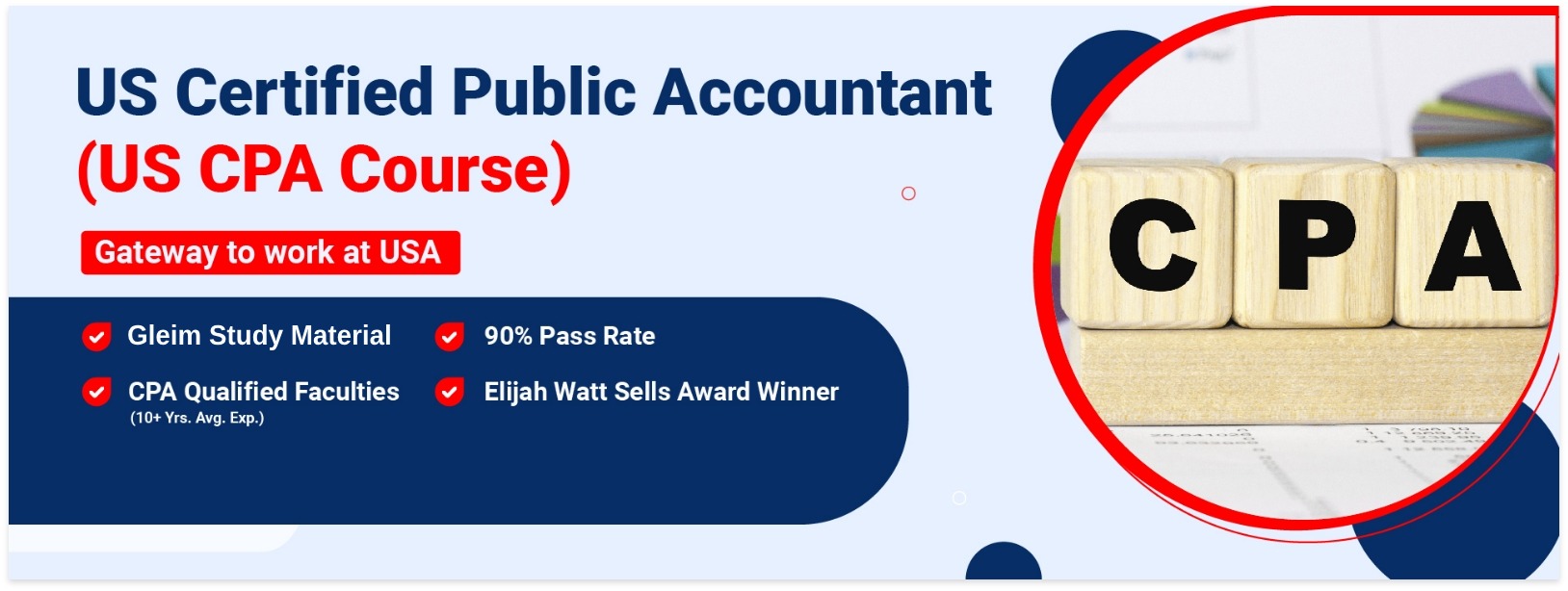CPA Course: Become a Globally Qualified Professional with VGLD
A Certified Public Accountant (CPA) is a globally recognised degree that opens doors for accounting professionals in the fields of private equity firms, investment banks, accounting firms, auditing firms, hedge funds among many others. This qualification allows one to practice as a licensed and certified accountant in countries such as Australia, Canada, the USA and New Zealand, among other reputable places globally.
The full form of CPA is Certified Public Accountant, and in order to become CPA certified, it is necessary to complete all the qualifying examinations and work experience as described in the CPA course details. It is highly recommended that individuals who are in the process of preparing for CPA certification undertake a CPA course in order to make their preparation more structured and feel much more confident in their approach towards their examinations.

US CPA course syllabus
The US CPA exam has three core subjects, namely Financial Accounting and Reporting (FAR), Auditing and Attestation (AUD), Taxation and Regulation (REG) along with three discipline subjects that are Information Systems and Controls (ISC), Business Analysis and Reporting (BAR) and Tax Compliance and Planning (TCP). It involves one examination that covers different topics of the subjects mentioned below.
There are various types of questions in the form of multiple-choice questions (MCQs), task-based simulations (TBSs), and written communication tasks (WCT), wherein MCQs hold 50% weightage and the simulations have the remaining 50%. It is a four-hour test with four sections as described below and an individual is required to complete all the sections in a period that depends on the state board.
The following are the different topics covered under each of the four subjects in the CPA examination, along with their weightage.
| SUBJECT | TOPICS | WEIGHTAGE |
|---|---|---|
| Financial Accounting and Reporting |
Financial Reporting Select Balance Sheet Accounts Select Transactions |
30-40% 30-40% 25-35% |
| Auditing and Attestation |
Professional Responsibilities, Ethics, and General Principles Assessing Risk and Developing a Planned Response Performing Further Procedures and Obtaining Evidence Forming Conclusions and Reporting |
15-25% 25-35% 30-40% 10-20% |
| Business Analysis and Reporting |
Business Analysis Technical Accounting and Reporting State and Local Governments |
40-50% 35-45% 10-20% |
| Information Systems and Controls |
Information Systems and Data Management Security, Confidentiality, and Privacy Considerations for System and Organization Controls (SOC) Engagements |
35-45% 35-45% 15-25% |
| Taxation and Regulation |
Ethics, Professional Responsibilities and Federal Tax Procedures Business Law Federal Taxation of Property Transactions Federal Taxation of Entities Federal Taxation of Individuals |
10-20% 15-25% 5-15% 23-33% 23-32% |
| Tax Compliance and Planning |
Tax Compliance and Planning for Individuals and Personal Financial Planning Entity Tax Compliance Entity Tax Planning Property Transactions (disposition of assets) |
30-40% 30-40% 10-20% 10-20% |
While the breakage of multiple-choice questions, task-based simulations, and written communication varies from subject to subject, it is necessary to be well prepared and thorough with all the topics of each subject, depending on their weightage.
US CPA Course Eligibility
The minimum eligibility criteria are having a bachelor's degree in any one of the streams among Commerce, Accounting, Finance or Arts. You would also need to have 120 credits to take the CPA exam and 150 credits to get an official CPA license.
- If you are from CA inter/ CS inter/ ICWA inter/ or a diploma, you would just need 30 credit points.
- If you are from an M.com/ MBA/ CA/ CS/ ICWA background, you will get 60 credit points.
- And if you are from a BCom/ BBA/ BA (economics)/ BMS/ BFA background, you will have 90 credit points.
US CPA Job Responsibilities
The major job role responsibilities of a CPA professional involve managing and planning the financial goals of an organisation or individuals as a financial advisor. A CPA mainly focuses on the following roles in the organisation:
- Identify and resolve any financial issues.
- Manage the budgeting of projects.
- Audit financial statements and make sure they are compliant
- Balance financial records
- Create, organise, and update accounting records.
While these are some of the core duties and responsibilities of a CPA, there are many other duties and roles that they play in an organisation that make a US CPA a valuable asset to any business.
What is the salary of a US CPA?
The total salary package of a CPA professional varies depending on their experience, location, job roles and skills but it is much higher than that of a non-CPA accountant.
In India, a fresh CPA professional can earn an average salary of 15 LPA and those who have experience of 3 to 5 years earn between 16 and 20 LPA. Senior-level professionals and those who are working with the Big 4 or MNCs earn salaries up to 25 LPA and more.
Globally, US CPA salaries start from $45,000 - $70000 per year and it also depends on their role, industry and the location they are at.
The US CPA certification is widely respected, and their salaries reflect the value and demand for certified professionals in roles like-
- Financial Analyst
- Audit Manager
- Tax Consultant
- CFO
- Risk & Compliance Manager
A key advantage of pursuing the US CPA course is that it offers excellent return on investment (ROI) in terms of career growth and salary potential.
Steps to become a US CPA

Step 1: Eligibility
Document verification by the VGLD teamStep 2: Evaluation
Jurisdiction (state board) allocation by the VGLD team, Online application with the evaluation agencies for Foreign credential evaluationStep 3: Verification
State Board RegistrationStep 4: Preparation
Exam preparation using VGLD live Classes + Gleim books + Recorded Sessions + Mocks, etc.Step 5: Examination
Online application for exams Exam BookingStep 6: License
Ethics exam Document filing with the state boardEthics exam Document filing with the state boardCareers after US CPA
The certified public accountant qualification is one of the most reputable qualifications globally. The preparation for the US CPA exam involves a lot of commitment and time management, but it can open a lot of doors for limitless opportunities. One of the most common questions that individuals have after qualifying for a CPA is- what are the careers after a US CPA?
Some of the career options have been listed below-
Public Accounting
- Budget Analyst
- Business Systems Analyst
- Tax Examiner
Specialist
- Internal Auditing
- Risk Assessments Officer
Government, Business, and Not-for-Profits
- Controller
- Staff Internal Audit
- Staff- Tax Accounting
- Financial Accounting & Reporting
Financial Advisor
Corporate Accountant
Finance Director
Benefits of a US CPA
There are numerous benefits of a US CPA. You can get global recognition and even upscale career opportunities worldwide. The following are some of the benefits of becoming a CPA certified:
- Global Prestige and Recognition: Becoming a certified public accountant can increase one's prestige and make them globally recognised because of the international nature of this qualification.
- Variety of Career Options: From making a career in equity firms to getting employed in MNCs & Big4s, the CPA qualification gives an individual the choice to choose from a wide range of career options with good pay.
- Good Pay Package: The CPA qualification involves a one-time investment with good returns. If an individual gets CPA certified, they get a good salary package. A CPA professional, on average, makes around INR 10-12 LPA, depending on their years of experience, skills among other things.
- Job Security: Only a US CPA can audit financial statements in the US and US-based companies in India. Regardless of which country or city you work in—Dubai, India, the US or Canada—you will always have so many opportunities.
- Black Belt Accountant: CPAs are also known by the title of "black belt of accounting". US CPAs are called Indian CAs of the US because the CPA also has a super tough examination just like CA. This is the reason why the US CPA certification is considered to be one of the most advanced accounting certifications.

Frequently Asked Questions (FAQs)
For Examination: Graduation + 1 year diploma
For Licensing: Graduation + Post-Graduation degree/CA











 +91-9700000038
+91-9700000038 Direction
Direction